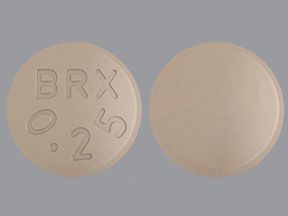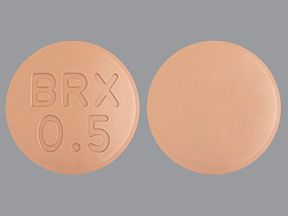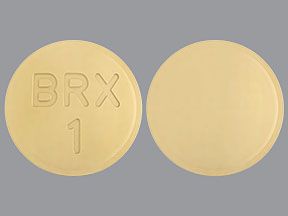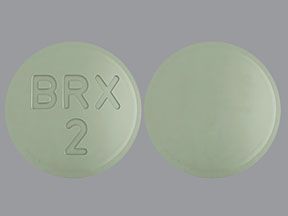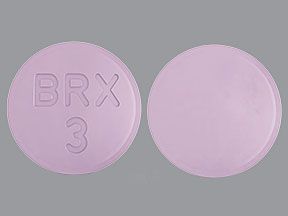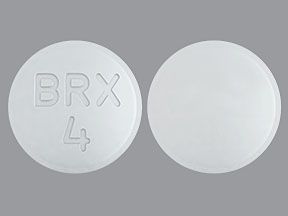Rexulti (brexpiprazole) is a prescription drug that’s used to treat schizophrenia, among other conditions. The drug comes as a tablet that you swallow. It’s usually taken once per day.
Rexulti is used to treat:
- schizophrenia in adults and certain children
- major depressive disorder (which is often simply called depression) in adults*
- agitation from dementia caused by Alzheimer’s disease in adults
The active ingredient in Rexulti is brexpiprazole. (An active ingredient is what makes a drug work.)
Rexulti belongs to a group of drugs called atypical antipsychotics.
This article describes the dosages of Rexulti, as well as its strengths and how to take it. To learn more about Rexulti, see this in-depth article.
* For this use, Rexulti is taken together with an antidepressant.
Rexulti Images
This section describes the usual dosages of Rexulti. Keep reading to learn more.
What is Rexulti’s form?
Rexulti comes as a tablet you take by swallowing.
What strengths does Rexulti come in?
Rexulti comes in a range of strengths. This allows your doctor to adjust your dosage as needed.
Rexulti comes in the following strengths: 0.25 milligrams (mg), 0.5 mg, 1 mg, 2 mg, 3 mg, and 4 mg.
What are the typical dosages of Rexulti?
Your dosage of Rexulti will depend on many factors, such as:
- the condition being treated
- your age
- how well your body responds to the drug
- other medications you may be taking for your condition
- medications you may be taking for other conditions
- your body’s ability to metabolize (break down) Rexulti
Typically, your doctor will start you on a low dosage. Then they’ll adjust your dosage over time to find the right one for you. Your doctor will ultimately prescribe the smallest dosage that provides the desired effect.
The information below describes dosages that are commonly used or recommended. However, be sure to take the dosage your doctor prescribes for you. Your doctor will determine the best dosage to fit your needs.
Dosage for depression
For adults with depression, Rexulti is prescribed as an adjunctive treatment. This means it’s given with other medications that treat depression. Rexulti is typically prescribed after you’ve tried a different antidepressant and are still having symptoms of depression.
The two recommended starting doses in adults with depression are:
- 0.5 mg once per day
- 1 mg once per day
Your dosage will then be increased weekly until you reach the smallest dosage that is most effective and causes the fewest side effects.
The recommended Rexulti dosage for treating depression is 2 mg per day. However, you and your doctor will determine what dosage is best for you. The maximum recommended daily dose is 3 mg.
If you’ve been on a steady dose of Rexulti but start to feel either symptoms of depression or side effects, talk with your doctor. Depending on your symptoms, your doctor may change your dosage or switch you to a different medication.
But don’t make any changes to your dosage on your own. This could worsen your symptoms or side effects.
Dosage for schizophrenia
The starting dosage of Rexulti for adults with schizophrenia is 1 mg once per day. The dosage is then slowly increased so that you’re taking 2 mg to 4 mg once per day.
An example of a dosing schedule your doctor may prescribe when you start treatment is:
- 1 mg once per day on days 1–4
- 2 mg once per day on days 5–7
- if needed, 4 mg once per day from day 8 onward
The recommended Rexulti dosage for treating schizophrenia is between 2 mg and 4 mg per day. The maximum recommended daily dose for this condition is 4 mg.
Even when you’re on a steady dose of Rexulti, you’ll have regular visits with your doctor to make sure the medication continues to be effective. If you feel the return of symptoms, don’t make any changes to your dosage on your own. Be sure to call your doctor to discuss any possible changes.
Dosage for agitation
The starting dosage for adults with agitation from dementia caused by Alzheimer’s disease is 0.5 mg once per day. The dosage is then slowly increased to 2 mg once per day. Note that you’ll take this drug each day to treat agitation. Rexulti is not meant to be taken as needed when you experience agitation.
The dosing schedule your doctor will likely prescribe when you start treatment is:
- 0.5 mg once per day on days 1–7
- 1 mg once per day on days 8–14
- 2 mg once per day from day 15 onward
The recommended Rexulti dosage for treating agitation is 2 mg per day. However, you and your doctor will determine what dosage is best for you. The maximum recommended daily dose is 3 mg.
If you’ve been on a steady dose of Rexulti but start to feel symptoms of agitation or side effects, talk with your doctor. Depending on your symptoms, your doctor may change your dosage or switch you to a different medication. Be sure not to make any changes to your dosage on your own. This could worsen your symptoms or side effects.
Is Rexulti used long term?
Yes, Rexulti is typically used as a long-term treatment. If you and your doctor determine that Rexulti is safe and effective for you, it’s likely that you’ll use it long term.
But for some people, Rexulti may be used for a short period. If that’s true for you, when you’re ready, your doctor will slowly lower your Rexulti dosage until you stop taking it completely.
What’s the dosage of Rexulti for children?
Rexulti is used to help treat schizophrenia in children ages 13–17 years.
The starting dosage for this use is 0.5 mg once per day. The dosage is then slowly increased so that a child is taking 2 mg to 4 mg once per day.
An example of a dosing schedule your child’s doctor may prescribe when your child starts treatment is:
- 0.5 mg once per day on days 1–4
- 1 mg once per day on days 5–7
- 2 mg once per day from day 8 onward
If needed, the doctor may increase your child’s dosage each week until they are taking the best dosage for them. The maximum recommended daily dose for treating schizophrenia in children is 4 mg.
Note that Rexulti may raise the risk of suicidal thoughts or actions in children and adults ages 24 years and younger. For more information, see the “Boxed warnings” section at the top of this article.
For more information about Rexulti’s dosage for children, talk with your child’s doctor or a pharmacist.
Dosage adjustments
In some situations, your doctor may need to make specific adjustments to your dosage.
- In case of liver or kidney problems: If you have liver or kidney problems, your body may take longer to metabolize (break down) Rexulti. Your doctor will likely start you on a lower dosage to make sure the drug is safe for you to take. The maximum dosage may also be lower based on your liver or kidney function.
- In case of drug interactions: Rexulti is metabolized by proteins in your body called enzymes. If you take certain medications with Rexulti, they can make those enzymes break down Rexulti more quickly or more slowly. Depending on what drug you’re taking along with Rexulti, your doctor may change your Rexulti dosage accordingly.
If you have liver or kidney problems or take other medications besides Rexulti, talk with your doctor. They can tell you more about how it may affect your dosage.
Here are answers to some common questions about Rexulti dosage.
Is Rexulti used for bipolar disorder and anxiety? If so, what are the dosages?
Rexulti is not approved as a treatment for bipolar disorder or anxiety. However, it may be used off-label for these conditions. (Off-label drug use is when an FDA-approved drug is used for a purpose other than what it’s approved for.)
One
And a different, small
For information about treatments for bipolar disorder or anxiety, talk with your doctor or pharmacist.
My doctor mentioned a “therapeutic dose” of Rexulti. What does that mean?
A therapeutic dose is one that’s effective for your condition. Your doctor will adjust your dose until it reaches a therapeutic level. They will also try to balance effectiveness with limited side effects. When you reach a therapeutic dosage, you’ll likely stay at this dosage for as long as it works.
Like most medications, Rexulti is not a “one size fits all” drug. That means there’s no particular dosage that’s effective for everyone.
When you first start taking Rexulti, your doctor will start you at a low dosage. Then they’ll steadily increase your dosage each week while monitoring how you feel and what side effects you may have. When you reach the dosage that seems best for you, they’ll keep you at that dosage.
Don’t use more Rexulti than your doctor prescribes. Using more than this can lead to serious side effects.
What to do in case you take too much Rexulti
Call your doctor right away if you think you’ve taken too much Rexulti. You can also call 800-222-1222 to reach America’s Poison Centers or use its online resource.
However, if you have severe symptoms, call 911 (or your local emergency number) immediately or go to the nearest emergency room.
The dosage of Rexulti you’re prescribed may depend on several factors. These include:
- the type and severity of the condition being treated
- your age
- other conditions you may have (see “Dosage adjustments” under “What is Rexulti’s dosage?”)
Rexulti comes as a tablet that you take by swallowing once per day. You can take it with or without food.
You may want to take your Rexulti dose around the same time each day. This could help you stay on schedule with your medication.
If you miss a dose of Rexulti, take it as soon as you remember. But if it’s almost time for your next dose, just skip the missed dose and take your next dose at the regular time. You shouldn’t take two doses at once to make up for a missed dose. Doing this could raise your risk of side effects from the drug.
If you have any questions about when to take your next dose after missing a dose, talk with your doctor.
If you need help remembering to take your dose of Rexulti on time, try using a medication reminder. This can include setting an alarm, downloading a reminder app, or setting a timer on your phone. A kitchen timer can work, too.
Studies of Rexulti didn’t report withdrawal symptoms or dependence* occurring when people stopped using the drug. However, tardive dyskinesia has been reported in people using Rexulti. In some cases, this condition began after people stopped using Rexulti. With tardive dyskinesia, you may experience uncontrolled movements of your body that are unusual or jerky.
You should not make changes to your Rexulti dosage or stop taking the drug unless your doctor recommends it.
If you have questions about stopping your Rexulti treatment safely, talk with your doctor.
* Withdrawal symptoms are side effects that can occur when you stop taking a drug that your body has become dependent on. With drug dependence, your body needs the drug to function as usual.
The sections above describe the typical Rexulti dosages provided by the drug’s manufacturer. If your doctor recommends Rexulti for you, they’ll prescribe the dosage that’s right for you.
Remember, you should not change your dosage of Rexulti without your doctor’s recommendation. Only take Rexulti exactly as prescribed. Talk with your doctor if you have questions or concerns about your current dosage.
Here are some examples of questions you may want to ask your doctor:
- What if Rexulti stops working? Would a different dosage help me?
- Would a different dosage raise or lower my risk of side effects from Rexulti?
- If I have liver disease, can I still take Rexulti?
- Does my dosage of Rexulti need to change if I’m taking other drugs along with it?
To learn more about Rexulti, see these articles:
- All About Rexulti – Brexpiprazole
- Rexulti and Cost: What You Need to Know
- Rexulti Interactions: Alcohol, Medications, and Others
- Side Effects of Rexulti: What You Need to Know
- Abilify vs. Rexulti: What You Should Know
To get information on different conditions and tips for improving your health, subscribe to any of Healthline’s newsletters. You may also want to check out the online communities at Bezzy. It’s a place where people with certain conditions can find support and connect with others.
Q:
If I start to have side effects from Rexulti, will a lower dosage reduce the side effects and still treat my condition?
AnonymousA:
Possibly. If you begin experiencing side effects that make taking Rexulti an issue, your doctor will likely lower your dose. However, they must also find a balance between treating your condition and managing the drug’s side effects.
If lowering your dose causes Rexulti to treat your condition less effectively, talk with your doctor. Together, you can weigh the benefits and risks of taking Rexulti. This can help you and your doctor determine whether the drug is right for you or if you should try another treatment.
The Healthline Pharmacist TeamAnswers represent the opinions of our medical experts. All content is strictly informational and should not be considered medical advice.Disclaimer: Healthline has made every effort to make certain that all information is factually correct, comprehensive, and up to date. However, this article should not be used as a substitute for the knowledge and expertise of a licensed healthcare professional. You should always consult your doctor or another healthcare professional before taking any medication. The drug information contained herein is subject to change and is not intended to cover all possible uses, directions, precautions, warnings, drug interactions, allergic reactions, or adverse effects. The absence of warnings or other information for a given drug does not indicate that the drug or drug combination is safe, effective, or appropriate for all patients or all specific uses.

